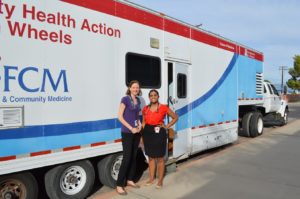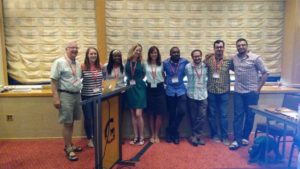What Are Your Thoughts on Work-Life Balance/Imbalance in Science and Medicine?
My blog post this month is meant to be a starting point for discussion. There are a plethora of articles and blog posts on work-life balance/imbalance in medicine and science (and many other professions). Some articles and blog posts even discuss that it is not possible to have work-life balance in medicine/science/academia1-3. As the winter holiday season comes to an end and a new year and decade starts, I find myself reassessing my personal and professional goals and resolutions for this upcoming year and decade. On my list is “continuing to work on work-life balance.” My blog is meant to stimulate discussion and solicit advice from those of you in science and medicine on potential tips to improve work-life balance. Figuring out how to balance the personal and professional aspects of our lives throughout a long and arduous career can be a formidable process.
Some people have voiced concerns about the recommendations often told to trainees and early career physicians/scientists to maintain work-life balance and wellness in order to prevent burnout: get adequate sleep, eat well, exercise, meditate, pet dogs, wake up earlier to plan your day, travel, read nonmedical/nonscience books, continue your hobbies, find good mentors, and spend time with family and friends all while providing good clinical care and/or doing good research. How are there enough hours in a day to do all of this?
An article in The Atlantic published last year entitled “Give Up on Work-Life Balance”4 discusses a recommendation from Brad Stulberg, author of The Passion Paradox, of not thinking of work-life balance as dividing hours within a day for personal and work activities. Alternatively, consider balance in terms of “seasons.” For example, one “season” could be a few years where the majority of the time is focused on one’s training/career and another “season”, possibly during a time when one has young children, where focus is on spending time with family. One of my mentors who has young children says that when he goes home, he prioritizes spending time with family and tries not to do any work until he and his wife go to bed. Some people have noted that they dislike the term work-life balance since it implies that there is a scale where one side is competing against the other. Instead, “integrating” work and personal lives is encouraged. Unfortunately, careers in science and/or medicine do not always allow for easy integration of work and personal lives, but system changes can occur to allow for better integration of work and personal life. For example, I applaud the efforts of one of my co-AHA early career bloggers, Dr. Nosheen Reza (@noshreza), in assisting with establishing a culture and creating tangible changes to support breastfeeding cardiology fellows5. Another AHA early career blogger, Dr. Renee Bullock-Palmer (@RBP0612) wrote a blog post last year discussing tips for integrating motherhood and a career as a female cardiologist (https://earlycareervoice.professional.heart.org/balancing-versus-integration-of-motherhood-and-your-career-as-a-female-cardiologist/).
Many established researchers and clinicians have recently told me that they regret not spending more time with their families. This same sentiment has been echoed by many clinicians/researchers on Twitter over the holiday season. While it is not always possible to spend every holiday with loved ones, especially while in training, allotting some protected time to spend with loved ones is important for maintaining wellness.
Establishing work-life balance is a constant evolving process dependent on the stage of our careers and personal lives and is a very individualized process. As mentioned before, I hope that we can have a further discussion on work-life balance and that you will share some tips on ways to improve work-life balance. I wish all of you a happy, healthy, and productive new year!
- Lazzari, Elisa. To be a top performer you need to be happy – something academics tend to forget. Naturejobs Blog. 13 Jun 2016. http://blogs.nature.com/naturejobs/2016/06/13/can-scientists-really-have-worklife-balance/.
- Powell, K. Young, talented and fed-up: scientists tell their stories. Nature538, 446–449 (2016).
- Is Work-Life Balance for Physicians a Unicorn? com. 3 Jan 2018. https://www.kevinmd.com/blog/2018/01/work-life-balance-physicians-unicorn.html
- Khazan, Olga. Give Up on Work-Life Balance. The Atlantic. Atlantic Media Company. 30 May 2019. https://www.theatlantic.com/health/archive/2019/05/work-life-balance/590662/.
- Kay J, Reza N and Silvestry FE. Establishing and Expecting a Culture of Support for Breastfeeding Cardiology Fellows. JACC: Case Reports. 2019;1:680-683.
The views, opinions and positions expressed within this blog are those of the author(s) alone and do not represent those of the American Heart Association. The accuracy, completeness and validity of any statements made within this article are not guaranteed. We accept no liability for any errors, omissions or representations. The copyright of this content belongs to the author and any liability with regards to infringement of intellectual property rights remains with them. The Early Career Voice blog is not intended to provide medical advice or treatment. Only your healthcare provider can provide that. The American Heart Association recommends that you consult your healthcare provider regarding your personal health matters. If you think you are having a heart attack, stroke or another emergency, please call 911 immediately.
 If you are an early career researcher, this question might have crossed your mind at some point: “What’s the best career choice after finishing my PhD – ‘industry’ or ‘academia?'”
If you are an early career researcher, this question might have crossed your mind at some point: “What’s the best career choice after finishing my PhD – ‘industry’ or ‘academia?'”
